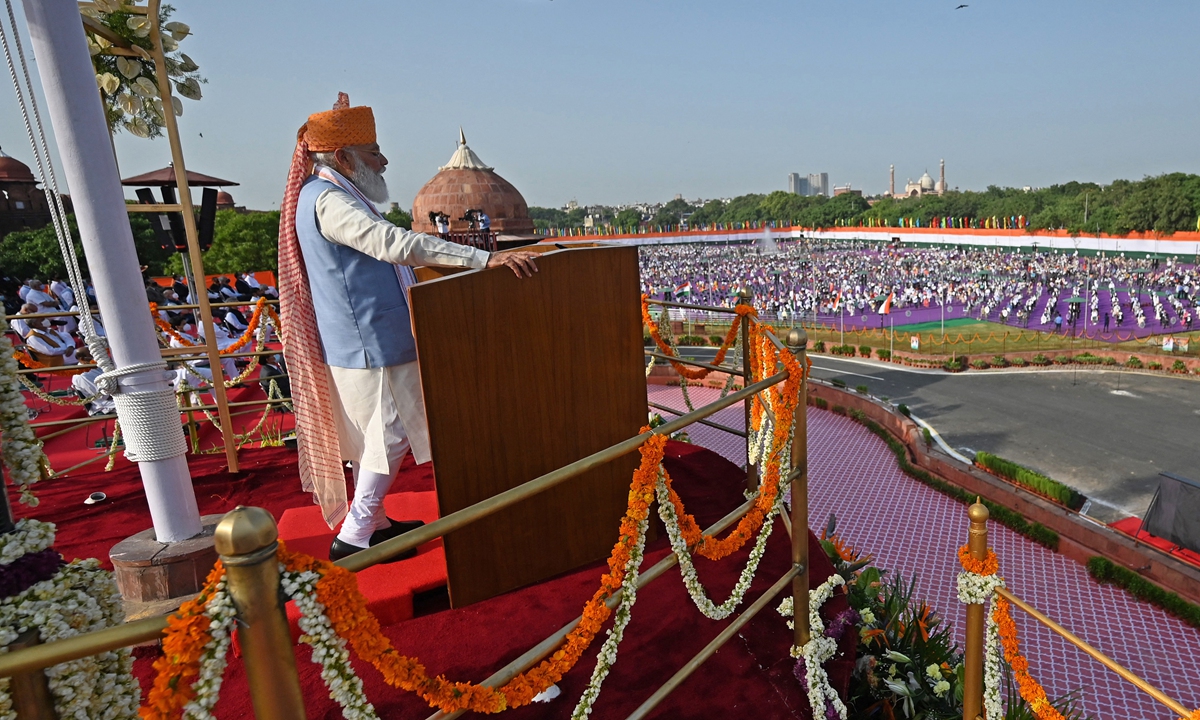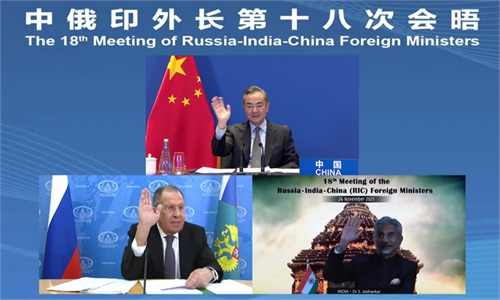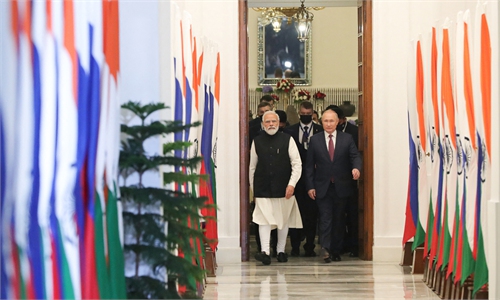
India's Prime Minister Narendra Modi addresses the nation from the ramparts of the Red Fort during the celebrations to mark the country's 75th Independence Day in New Delhi on Sunday. Photo: AFP
Is India an asset or a liability to the US Indo-Pacific alliance? A recent article published by The National Interest described India as a "problematic ally" of the US because "brings a lot of baggage to the alliance besides its reluctance to become fully plugged into US defense systems." The article also speculates that India's democracy is at risk of further backsliding. Such a view is not rare among many American elites.
The US mind-set toward India has always been quite complicated. The US once had high expectations of India at the time of its independence. India declared its independence by a nonviolent but peaceful approach, creating a new form of national independence movement which could have the potential to be a new resolution model for violence and conflicts. On the other hand, India, as a Western-style democratic country established on the foundations of British politics, was highly anticipated by the US to be on the path of democracy which would be proof that democracy could succeed even in backward countries and thus become beneficial to the US in its ideological struggle with the Soviet Union.
But to the disappointment of the US, although India politically followed the Western model, it preferred the Soviet model of a planned economy and adopted the principles of Non-Alignment, while being close to the Soviet Union under most circumstances. This is of great concern to the US. Keeping an eye on India has thus been one of the three long-term missions of the US military presence in the Indian Ocean.
After the Soviet Union disintegrated, India got an opportunity to adjust its foreign policy. Initially, the US did not care about India, which frustrated the latter. In a bid to receive more international attention and boost its international status, India carried out a series of nuclear explosions in 1998. The US and Japan imposed sanctions on India, which were lifted in 2001. Drawing global attention in a special way, India made the US attach more significance to it and promote relations with India. In 2005, the US and India signed a Civilian Nuclear Agreement, a landmark in the history of the US-India relationship. The wedge over the nuclear issue finally concluded with a special treatment granted to India by the US.
The US hopes to woo India to become a strategic balancer in the global landscape of the US, helping the US contain its strategic competitors at a critical moment. This worked in the Trump era and has further developed under the Biden administration. The US and India signed a 10-year defense framework agreement and reached four defense agreements covering military information, logistics exchange, compatibility and security. The US granted India the right to import a wide range of high-tech products, just as it did to Japan and South Korea. Furthermore, the US and India have also deepened their cooperative relations through the Quad mechanism, the Indo-Pacific Strategy and the 2+2 dialogue between the foreign and defense ministers of two countries. These practices between the US and India have piled heavy pressure on China.
Still, India cannot completely satisfy the US. The US wishes that India should become a second Japan or "America's deputy sheriff" in the Indo-Pacific region. In short, it wants to control India. However, India wants to use the US' power to contain China and benefit from the China-US competition to boost its own economic development and enhance its status on the global stage. At the same time, New Delhi does not want to be controlled by Washington or lose its strategic autonomy. Nor does it want to damage its image and status as a great power because of the cooperation with Washington.
Therefore, India has tilted away from the Non-Aligned Movement, and proposed a new strategy of multi-alignment to develop closer relations with other major powers simultaneously, especially with Russia. It is clear that India intends to develop its relationship with Russia to balance its relations with the US and thus, to preserve its strategic autonomy.
India is a large country aiming to be a world power. It also likes to claim itself to be a global great power. India has taken a unique path of strategic autonomy since its independence, which has allowed the country to benefit from both sides of the conflict. This also accords with India's cultural traditions and interests. So far, India has shown no signs of changing the principle of strategic autonomy.
The author is a professor at the Center for American Studies, Fudan University. opinion@globaltimes.com.cn



